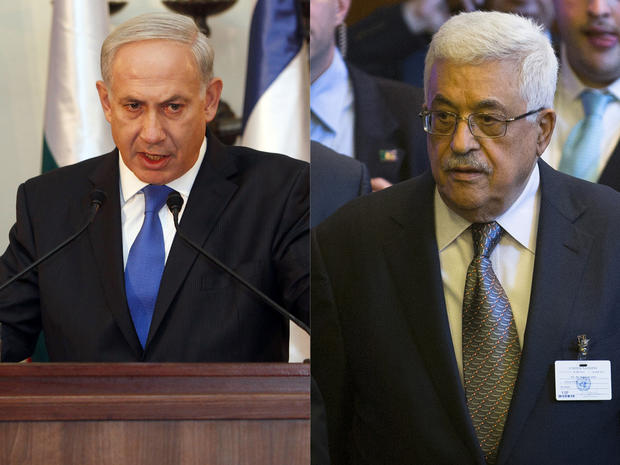Iran overshadows Palestinian issue at U.N.
(CBS News) JERUSALEM - Israeli Prime Minister Benjamin Netanyahu and Palestinian President Mahmoud Abbas will address the United Nations General Assembly on Thursday, but the visions they will present to the world body are worlds apart.
Abbas wants to put the Palestinian issue back on the international agenda and will appeal to the U.N. to recognize the dispossessed Palestinian people as an independent state.
But the man who holds most of the cards with regard to granting the Palestinians statehood, Netanyahu, is playing an entirely different hand. In spite of the persistent threat of terrorism from Palestinian militant groups, Netanyahu has put the issue on a back burner.
In the Israeli leader's mind, that threat pales in comparison to the prospect of the Islamic Republic of Iran obtaining nuclear weapons. That is seen as an existential threat and Netanyahu has warned time and again that he will not allow Iran - which has threatened to wipe Israel "off the map" - to bring a "second Holocaust" on the Jewish people.
Video: Ahmadinejad denies nuclear weapons ambition
Iran's Ahmadinejad wants new world order
Iran test fires missiles in Persian Gulf
Netanyahu will try to add a sense of urgency to the Iran issue, warning that the time for diplomacy is running out, and he has leverage: he has warned that if the international community fails to stop Iran, and if the U.S. fails to set clear "red lines" that spell out what would provoke American military action, Israel might launch a preemptive strike on Iran's nuclear facilities on its own.
Israel says Iran is burying its nuclear components deep underground in concrete and will soon reach a "zone of immunity" - the point where Israeli air strikes would no longer be effective.
Netanyahu's saber rattling is giving other world leaders the jitters. An Israeli attack could spark a major regional war, draw in U.S. forces in the Persian Gulf, and skyrocketing oil prices could derail the delicate global economic recovery.
This looming crisis, coupled with the turmoil of the Arab Spring, has pushed the Palestinian issue off center stage. Israeli officials have pointed out that the Arab revolutions have nothing to do with the Palestinians, putting into question the traditional logic that the Palestinian issue is the source of all the region's problems and resolving it would bring peace and tranquility.
Furthermore, the Palestinians remain bitterly divided. While the moderate Abbas controls the West Bank, the Islamic militant group Hamas - classified by the U.S. as a terrorist organization - controls the Gaza Strip. Hamas' charter calls for the destruction of Israel.
Abbas says he supports a negotiated solution for a Palestinian state, but peace talks with Israel have been deadlocked since Netanyahu took office in March 2009. Abbas has demanded a freeze on all settlement construction in the West Bank and East Jerusalem as a precondition for talks. Netanyahu, who is backed by parties which support the expansion of Jewish settlements, has refused.
The U.S. has virtually given up on trying to goad the parties back to the negotiating table. President Obama's special Middle East envoy, George Mitchell, resigned in frustration in 2011 after two years on the job, and Secretary of State Hillary Clinton has only visited Israel twice in the past two years.
As a result, Abbas has sought to sideline Israel and seek recognition for Palestinian statehood directly from the U.N.
The U.S. blocked the bid last year in the Security Council, saying that Palestinian independence can only be achieved through direct negotiations with Israel.
This year, Abbas has a new strategy: He will bypass the Security Council, where the U.S. has a veto, and he will ask the 193-member General Assembly to upgrade the Palestinians' status to a non-member "observer state," giving them the same U.N. ranking as the Vatican. This tacit statehood would enable the Palestinians to pursue Israel through the international courts and other global forums.
"The day after (we get) non-member statehood, life will not be the same," says Palestinian chief negotiator Saeb Erekat, noting that 120 nations have already recognized "Palestine."
"Yes, the occupation will continue, the settlements will continue, the crimes of the settlers may continue, but there will be consequences," says Erekat.
Israel describes the Palestinians' unilateral efforts for statehood as "diplomatic warfare," and as the specter of conventional warfare with Iran holds the attention of Israel, and the world, it's hard to see the Israeli-Palestinian peace process getting back on track anytime soon.
This story was filed by CBS Radio News correspondent Robert Berger.